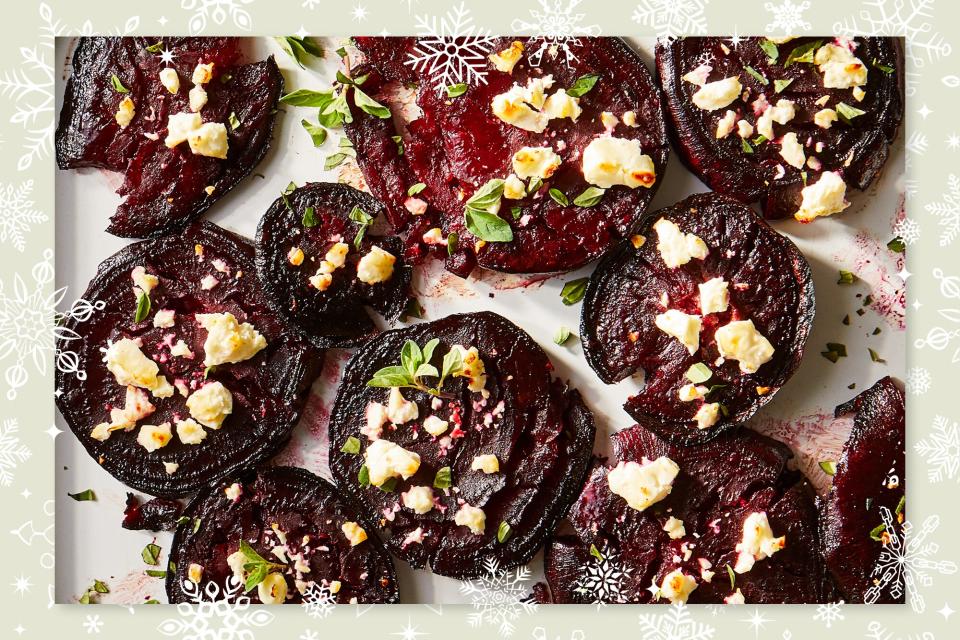7 Anti-Inflammatory Foods You Should Be Eating This Winter
Shorter days, colder temps, warm drinks and comfort foods are all things we commonly associate with winter—not usually bright-colored fresh produce. Yet, the colder weather means a new crop of fruits and vegetables is about to be at its peak in terms of flavor, nutrients and anti-inflammatory potential. While some inflammation is normal, chronic inflammation can up your risk of diseases such as cancer, dementia, diabetes and more. Eating an anti-inflammatory diet packed with inflammation-fighting foods can help keep you healthier in the long run.
While it's easy to overdo it on inflammatory foods around the holiday season (think: sugar cookies, processed foods and cocktails), you can also take some steps to help balance your diet by eating plenty of inflammation-fighting foods this winter. Here are the seven best anti-inflammatory winter foods.

Getty Images / Dimitris66, PHOTOGRAPHY / DERA BURRESON, STYLING / LAUREN MCANELLY / HOLLY RABIKIS
Best Anti-Inflammatory Foods to Eat This Winter
1. Pomegranate
Don't let pomegranate's outer layer intimidate you, because the tender seeds (also known as arils) and juice are both full of flavor and jam-packed with anti-inflammatory power. This is thanks to compounds like ellagitannin, anthocyanins and flavanols that act as antioxidants, quelling inflammation caused by free radical damage and preventing future damage. In fact, pomegranate's antioxidant potential is considered greater than that of red wine and green tea. Arils make a great substitute for berries or citrus segments in a salad, and you can also add pomegranate juice to teas, smoothies or kombucha for a tart, fruity punch.
2. Broccoli
While we may buy it year-round, broccoli is actually a winter vegetable because of its ability to thrive in cold weather. You likely know that eating several servings of vegetables each day is a key part of an anti-inflammatory diet, but did you know you can reap additional anti-inflammatory perks by choosing a vegetable in the cruciferous family like broccoli? Cruciferous veggies contain bioactive sulfur compounds called glucosinolates that minimize disease risk by decreasing inflammation. If you're not big on broccoli, incorporate other cold-weather cruciferous veggies like Brussels sprouts, kale, cabbage, Swiss chard and turnip greens.
3. Blood Oranges
All citrus fruits are packed with the immune-boosting antioxidant vitamin C, and most ripen to their sweetest flavor during the winter months—two things that make any citrus fruit (including oranges, grapefruits, lemons, limes, tangelos and other varieties) an excellent cold-weather addition to your diet. If you're looking for an extra antioxidant boost though, consider blood oranges. The vibrant red-orange color of their flesh comes from anthocyanins, the same compounds that make berries a top anti-inflammatory food. Blood oranges are delicious on their own, but they're also great in a salad, incorporated into a pan sauce or as a healthy dessert.
4. Leeks
Leeks are part of the allium family, which also includes onions, shallots and scallions. Allium vegetables and roots all contain quercetin, an anti-inflammatory compound that research suggests may lessen the inflammatory effects of harmful chemicals and compounds in the body. Found predominantly in winter and early spring, leeks can be a great substitute for other alliums in recipes. If you've never cooked with them, think of them as scallion with a bigger root and broader leaves and a slightly more pungent flavor (yet still milder than onions). We love them in soup, braised in the oven or even folded into mashed potatoes for a veggie boost.
5. Sweet Potatoes
Sweet potatoes are at the top of the list in terms of anti-inflammatory starchy veggies. This is partly due to them serving as a lower-glycemic carb source and being a good source of vitamin C, but also because of their impressive carotenoid content. Carotenoids (like beta carotene) impart the spud's deep orange color, but they also act protect cells from free radical damage that could create inflammation or exacerbate existing inflammation. Additionally, most carotenoids get converted to the active form of vitamin A (which is key in immune regulation and inflammation management) in the body. We like to roast sweet potatoes, stuff them with our favorite fillings and make them into healthier fries.
6. Beets
Beets are a great source of potassium, folate and vitamin C—all nutrients that play various roles in the immune system's regulation of inflammation. But two other compounds in beets—betaine and nitrates—really make them stand out as an anti-inflammatory star. Betaine is a lesser-known antioxidant-like compound that preliminary research links to lower inflammatory blood markers. And naturally occurring nitrates (different from ones added to cured and processed foods that pose potential health risks) appear to have an anti-inflammatory effect that lowers blood pressure.
7. Pears
Improving gut health is a key strategy for preventing and reducing inflammation, and research suggests the best way to do this is by eating more probiotic-rich foods (like yogurt, kombucha and fermented vegetables) and eating more prebiotics through high-fiber produce. Prebiotics are fibers that nourish our existing gut microbes, and pears are an excellent source of prebiotic fiber to help your good bacteria thrive. Pears are also one of the highest-fiber fruits (a medium pear contains approximately 6 grams of fiber). You can snack on a pear with some nut butter, toss some into a salad, roast them or make them into a healthy dessert.

